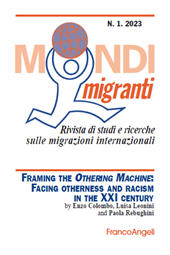Language, Nationhood, and Isolation in the Lives of Sri Lankan Tamil Refugees in India
61-77 p.
Divisions and resentments between the Tamils and the Sinhalese, two major ethnic groups in Sri Lanka, led to the exodus of Tamils to the neighbouring state of Tamil Nadu in India. From the beginning of the first major conflict in the early 1980s to the peak of the Eelam war in 20082009, it is estimated that over three millions lakh Sri Lankan Tamils have migrated to India, mostly to the southern state of Tamil Nadu. A majority of them were put in over 115 governmentrun refugee camps. These migrants preferred Tamil Nadu over other states in India for two major reasons: firstly, its proximity to the conflict area; secondly the common linguistic, cultural, and ethnic identities both the Sri Lankan Tamil migrants and the native Tamils share. The present paper is an attempt to understand the life of these refugees in Tamil Nadu, where they share many commonalities with the Tamil inhabitants.
Earlier studies show that irrespective of these commonly shared identities between the migrant Tamil refugees from Sri Lanka and the native Tamils, a process leading to the repatriation of the former is preferred over their integration and assimilation with the latter. The present study attempts to capture the process of 'othering' refugees although they share common linguistic and ethnic identities with the host community. [Publisher's text].
I conflitti e i risentimenti tra Tamil e Sinhalese, i due gruppi maggioritari dello Sri Lanka, provocarono l'esodo dei Tamil in India nel vicino stato di Tamil Nadu. Dall'inizio del conflitto nel 1980 fino all'apice della guerra di Eelam nel 2008/9, si stima che circa 3 milioni di Sri Lankan Tamils siano emigrati in India, soprattutto nello stato Tamil Nadu. La maggioranza di essi fu collocata in 115 campi per rifugiati. La maggior parte ha preferito stare nello stato di Tamil Nadu per due ragioni: la prima la vicinanza alla zona di conflitto, la seconda la condivisione dell'identità linguistica, culturale ed etnica condivisa con i Tamil Nadu. Questo saggio vuole analizzare la vita di questi rifugiati in Tamil Nadu, dove condividono con gli autoctoni moltissimi aspetti e caratteristiche.
Precedenti studi hanno messo in luce come malgrado le identità comuni condivise si preferisca un processo di rimpatrio dei rifugiati nello Sri Lanka, rispetto ad un processo di integrazione e di assimilazione con la popolazione autoctona. Il saggio proposto cerca di presentare come si forma il processo di alterità malgrado la comunanza linguistica, culturale e etnica con la comunità ospitante. [Testo dell'editore].
Fa parte di
Mondi migranti : 1, 2023-
Articoli dello stesso fascicolo (disponibili singolarmente)
-
Informazioni
Codice DOI: 10.3280/MM2023-001004
ISSN: 1972-4896
MATERIE
PAROLE CHIAVE
- rifugiati, Sri Lankan Tamils, alterità, etnicità, migrazione
- refugees, Sri Lankan Tamils, othering, ethnicity, migration


